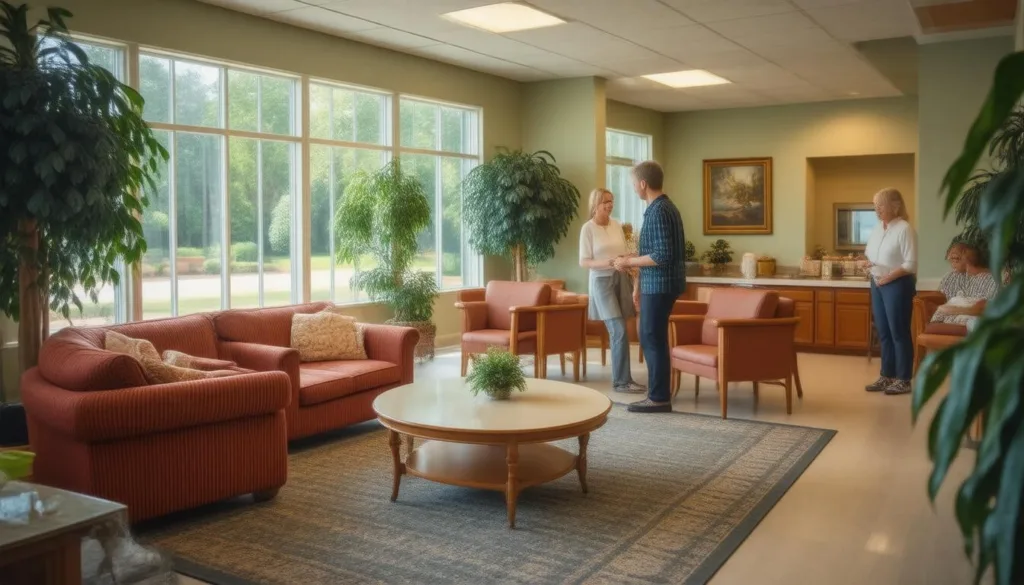Choosing the Right Elderly Care Home: Essential Tips for Families

Choosing the Right Elderly Care Home: Essential Tips for Families
Choosing an elderly care home is a pivotal decision affecting the well-being of aging loved ones. It’s more than a residence—it’s about ensuring a nurturing atmosphere that promotes health, happiness, and dignity.
With a multitude of options available, selecting the right elderly care home can be daunting. This guide offers essential tips for navigating through the choices, putting a premium on understanding different types of homes, assessing care quality, and involving the elderly in decision-making.
Join us as we delve into finding the ideal care facility for your loved one, where their care and comfort are prioritized.
Receive quality home care matches in minutes today with Amicare
Key Takeaways
- Familiarize yourself with the various types of elderly care homes available.
- Assess care quality by looking for key indicators like staff-to-resident ratios and cleanliness.
- Choose a location that is convenient for family visits and has proximity to healthcare services.
- Budget carefully by considering both upfront costs and ongoing expenses associated with elderly care.
- Involve the elderly in the decision-making process to ease the transition and ensure their comfort.
Understanding Different Types of Elderly Care Homes
It’s essential to comprehend the various types of elderly care facilities when exploring options for aging loved ones. From traditional nursing homes offering round-the-clock medical care to assisted living that provides independence with support for daily activities, each type serves unique needs.
Residential care homes offer personalized attention in a more intimate setting, while memory care facilities specialize in caring for those with Alzheimer’s or dementia, focusing on safety and cognitive support.
Understanding these options empowers families to choose wisely, ensuring not just health needs but also emotional well-being are met. At Amicare, our AI-driven platform connects families with caregivers suitable for any setting, simplifying this critical decision.
Assessing the Quality of Care
When evaluating an elderly care home, the quality of care provided significantly impacts your loved one’s well-being.
Key indicators such as staff qualifications, staff-to-resident ratios, cleanliness, and safety are essential in assessing a facility. Engaging with staff directly and reviewing testimonials offer insights into the real-world experience of the home.
This assessment will help ensure that your loved one thrives in a nurturing environment that enhances their quality of life.
‘The greatest gift you can give someone is your time and attention.’ – Jim Rohn
Receive quality home care matches in minutes today with Amicare
Location Matters: Finding the Right Neighborhood
Location is crucial when selecting an elderly care home as it affects not only accessibility for family visits but also the quality of life of residents. Safe, engaging neighborhoods with access to local amenities play a vital role in maintaining independence and social interaction.
Amicare helps locate elderly care homes in neighborhoods that prioritize connectivity and engagement, ensuring peace of mind for families.
Budgeting for Elderly Care: What to Consider
Budgeting carefully for elderly care involves understanding the various costs and payment options available. By considering all expenses, families can plan effectively, avoiding financial strain while ensuring comprehensive care.
Alternatives like Amicare’s personalized home care services offer cost-effective solutions that adapt to changing needs over time.
Visiting Potential Care Homes: What to Look For
Visiting potential care homes is critical. Assess the environment, interactions, staff ratios, care philosophy, and available amenities. Such factors ensure the facility meets the needs for physical care and emotional support.
Understanding these elements helps families make informed decisions that honor their loved ones’ dignity and independence.
Involving the Elderly in the Decision-Making Process
Engaging the elderly in choosing a care home respects their preferences and enhances their comfort. This collaborative approach not only honors their autonomy but also optimizes their care experiences.
Amicare’s marketplace of vetted caregivers ensures personalized care that aligns with individual needs, enriching the quality of life for seniors.
Making the Transition to an Elderly Care Home Easier
The transition to an elderly care home can be overwhelming. Amicare’s flexible solutions like in-home personalized care help maintain independence and reduce the stress associated with long-term care facility transitions.
This adaptive approach allows families to focus on safety and emotional well-being, simplifying the shift to an elderly care home.
Frequently Asked Questions
What are the different types of elderly care homes available?
Various elderly care homes cater to different needs, from independent living to specialized memory care. Identifying the appropriate type ensures optimal care for loved ones.
How can families assess the quality of care in an elderly care home?
Assessing the quality of care involves examining staff qualifications, facility cleanliness, and resident satisfaction. These factors are crucial in choosing a suitable care home.
Why is the location of an elderly care home important?
A strategic location enhances accessibility and overall satisfaction, making it essential in the selection process.
How should families approach budgeting for elderly care?
Budgeting for elderly care requires comprehensive planning, including understanding all potential costs and exploring various payment options.
What steps can be taken to make the transition to an elderly care home easier for the elderly?
To ease transitions, involve the elderly in decision-making, familiarize them with the new environment, and maintain open communication with care providers.
With over 6 million seniors in Canada and 93% preferring to age at home, the urgency to provide quality home care is clear. Join our marketplace today for reliable home care solutions.




